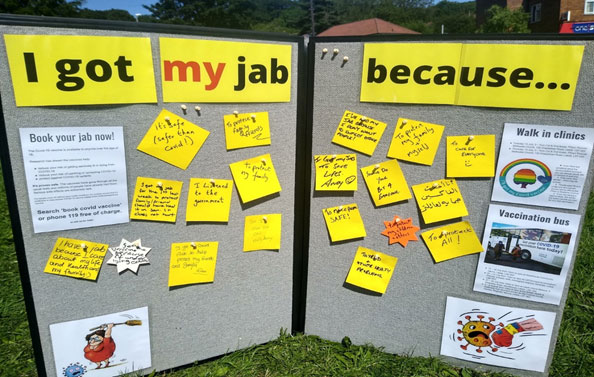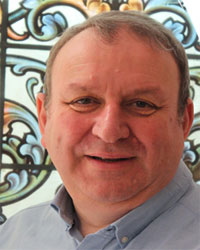The programme was designed to build trust and relationships through co-production and co-delivery, not only with the council, Public Health, Leeds CCG, and trusted local organisations; but through the creation of meaningful opportunities for local people and groups to act as COVID-19 community champions.
Background
The COVID-19 Community Champions programme developed additional capacity to support a range of COVID-19 messaging and activities in Leeds.
The programme was designed to build trust and relationships through co-production and co-delivery, not only with the council, Public Health, Leeds CCG, and trusted local organisations; but through the creation of meaningful opportunities for local people and groups to act as COVID-19 community champions.
The approach built upon existing work to facilitate improved access to clear, accessible, current, and consistent information; and further enhance opportunities to engage communities in system design.
What was the activity?
Delivered by Leeds City Council, Voluntary Action Leeds, Forum Central and Hamara (working in partnership with Public Health and Leeds CCG), over 75 diverse COVID-19 Community Champions from across the city were recruited and provided comprehensive training and access to ongoing volunteer support. The approach equipped champions with the knowledge, skills, resources, and support to facilitate quality conversations with communities and identified priority groups. Regular question and answer sessions with health professionals were provided, and champions were connected to up-to-date information and resources.
Champions were able to support community engagement activities led by statutory services and third sector organisations and/or delivery projects based on their own initiatives to facilitate community engagement.
What difference did COVID-19 Community Champions make?
This dedicated approach created a sense of confidence in the volunteers to champion health messages within their communities, making accurate information from trusted sources accessible.
Champions made a significant contribution toward partnership-led community engagement initiatives including the roving vaccination bus, women only vaccination clinics and enhanced testing work, which focused on areas with higher rates of vaccine hesitancy based on their geography and demographics. Champions provided accurate information, community reassurance and signposting, which evidence showed their contributions were a catalyst to getting people vaccinated; examples of impact they supported include:
- Roving vaccination bus: 2,754 people vaccinated, “Without Community Champions the bus would not have reached as many residents, they were very useful in supporting the vaccination effort and the diversity and unique language skills of the champions offered was very helpful. Champions’ contributions helped to show how much ethnicity and culture factored into people’s decisions over their own health”.
- Leeds City College (based within the largest ESOL provision in the city): 106 people vaccinated, “The role of the Community Champions was invaluable… we were able to effectively engage students in meaningful conversations about the vaccine and address hesitancy factors. Champions were able to act from a position of cultural awareness, knowledge, and experience. Where there was a match in cultural background and languages spoken between students and the champions, the interactions were positive”.
- Two women-only vaccination clinics: 154 women vaccinated.
Community champions developed and delivered community engagement activities based on their own initiatives, examples of impact include:
Humans Being, a community-led organisation, hosted a BBQ outside St Richard's Foodbank in Seacroft. The BBQ gave out free food to food bank users and passers-by and chatted to them about the vaccination programme. Champions felt more confident after completing the ‘having positive conversations' training, which enabled them to have more positive conversations with around 60 adults.
About 85 per cent of people they spoke to had already had their first jab at least. Several people who hadn't been vaccinated said that they would 'now book their first jab' Some hadn't known how to book or hadn't thought about it at all. A few people who were against it for health reasons said they may reconsider or seek more information. With only one person didn't want to engage with the topic at all.
Altogether it was a very successful day, and we would recommend other groups try a similar approach to promote any public health message. Thanks for all the amazing support from VAL, it's been a great experience for all of us and I think we've made a difference”.
Across the broad range of activity, two-way open dialogue was encouraged and facilitated to provide insights into community issues and concerns, to feed into and influence strategic decision making to inform future activity and approaches.
Throughout the COVID pandemic, good clear messaging has been so important. However, as a COVID Champion I can see that messaging fatigue is becoming a challenge. The support given by Forum Central and Leeds City Council has helped me to tackle this problem within my community, enabling me to think outside of the box and come up with creative solutions.
Alan, United Hebrew Congregation (UHC)
Across the broad range of activity, two-way open dialogue was encouraged and facilitated to provide insights into community issues and concerns, to feed into and influence strategic decision making to inform future activity and approaches.
COVID-19 Community Champions Micro Grants
- Micro grants of up to £1,000 further increased capacity to communicate COVID-19 information and guidance at a hyperlocal level; and engaged with a diversity of organisations and built new connections with small groups.
- Funded projects further improved reach into communities where uptake was at a lower level, engaged in places where statutory services don’t usually attend like sport, craft and faith events, and bespoke information sessions with trusted guest speakers, including faith and community influencers. Street outreach projects were delivered led by organisations with strong, trusted relationships with disadvantaged and marginalised communities in areas of higher vaccine hesitancy. Dedicated workers were deployed to carry key messages and vaccination information to those who are less engaged with structured programmes and organisations, such as popular local shopping facilities, hairdressers, barber shops, food take-aways and local parks etc. to involve residents who may miss general messaging. Communication resources were created and tailored to effectively engage diverse, marginalised, isolated, and hesitant communities.
- Projects provided information directly to communities to educate on key messages and guidance; encouraged safe behaviours and facilitate informed choice regarding COVID-19 and vaccinations. Micro grants maximized the skills, expertise and reach of organisations and grass root groups to promote key messages; health and wellbeing; and further identified need and meaningful solutions. A broad range of activity delivered engaged directly with diverse communities, priority, and at-risk groups.
Next steps
- The COVID-19 Community Champions programme reinforced the ethos communities prefer to have the information from trusted hyperlocal sources, as opposed to just from statutory services or the third sector.
- The programme was initially time-limited, however due to the great success, the activity is being sustained currently until March 2022. Delivery is led by Voluntary Action Leeds and Forum Central with the following opportunities available:
- Community Champions: will pledge to support COVID-19 and wider key health messages through engagement and communication with their family, friends, neighbours and their networks (in person or via social media).
- Community Engagement Champions: These volunteers will engage in more formal community engagement activities in the following ways:
- Support a range of partners including LCC and NHS in response to COVID-19 outbreaks, vaccination clinics/sites to promote health messaging in the community and access to vaccinations, including the booster vaccines. Partners can request to work with community champions by completing this [email protected]
- Design and deliver their own community engagement activities/events to share COVID-19 and key health messages with support provided by delivery providers.
Community Champions Organisations: such as the third sector, local businesses, educational establishments, including grass root groups, constituted groups and residents’ associations etc. will pledge to support COVID-19 messaging and sign-up staff and volunteers to become COVID-19 Community Champions to support sharing health messages around COVID-19 including vaccinations/boosters amongst staff, service users and communities.
Contact
Tim Taylor, Head of Public Health
Localities & Primary Care, Adults and Health Directorate, Leeds City Council
Email: [email protected]


